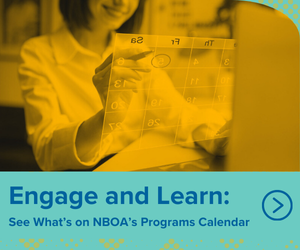
NBOA President and CEO
Schools matter. What we do matters. Specifically, the work of business leaders at independent schools matters. This was the message from leaders at Spence School, who welcomed attendees of the 2025 NBOA Annual Meeting to their hometown of New York City last Monday. Their words were repeated by John Gulla, executive director of the Edward E. Ford Foundation, as he accepted the 2025 Sarah Daignault Award for Outstanding Support of Independent Schools. While we knew those words were true before the meeting, they resonated in a new way when shared in a room of more than 1,400 leaders who share the sentiment.
The 2025 NBOA Annual Meeting was the largest in-person gathering of independent school business leaders to date. And what a meeting it was! New York City energized this meeting from the start, and the energy lasted all the way until our closing session. You could actually feel this from the attendees throughout the meeting.
Cultivating New Ideas with Kyle Scheele
What many of us have needed at the top of this year is a good laugh. Opening keynote speaker Kyle Scheele delivered many times over in that department. In addition to fun, he also provided five actionable steps for business leaders at independent schools to generate and support new ideas that can take their schools to new heights.
First, an idea needs a chance – that is, someone who believes in it. We’re all creative, Scheele said. Just because you aren’t carving a sculpture or producing a Broadway play doesn’t mean you don’t have a new and different take on the work of your school. Believe in your creativity and cultivate it.
Second, an idea needs a home. I hope every attendee of the 2025 NBOA Annual Meeting, in person or on-demand, comes away with a rich cache of ideas. These might be stored in a phone app, Word doc, handwritten notebook, collection of voice memos or something else. Find a method for idea collection that works for you and stick to it.
Third, an idea needs a time and place to be born. There’s never a perfect time to put a new idea into action, Scheele said. And the goal isn’t to think outside the box – “the box,” or the context in which an idea comes to fruition, is critical. Think about opportunities and limitations, and get going.
Fourth, an idea needs a bodyguard. Every organization has a self-appointed devil’s advocate, who is needed — at a certain point in the creative process, Scheele explained. That person may even be you at times. But to get off the ground, a new idea requires space to develop before it’s beaten down into nothing.
Last, and most important, an idea needs a crew. This is where school business leaders often shine. You know how to make things happen, how to operationalize words on paper or ideas passed around the board table. Tap your team and bring a new idea to life. It may be the next critical step in helping your school deliver its world-class mission to the families that need it most.
Scheele closed his talk by saying how deeply the independent school he attended through eighth grade impacted his life – it gave him the strong foundation for everything he does today. It can’t hurt to say it again: The work you do matters.
Future Proofing with Crystal Washington
Tuesday’s keynote brought a markedly different speaker, technology expert Crystal Washington, but she similarly urged independent school leaders to engage the lens of creativity as they work with new technology.
We will never be caught up in the realm of tech again. That may seem disheartening, but the good news is, no one else will be either.
Since the release of publicly available AI a couple years ago, it seems to be everywhere — from thought leadership pieces to television commercials to the applications we regularly use to do our work and live our lives. Washington had a clear warning for us at this time: We will never be caught up in the realm of tech again. That may seem disheartening, but the good news is, no one else will be either.
So what can we do when the future is unclear and may radically change how we operate at some unknown date?
As a certified futurist, Washington suggested a tabletop exercise to uncover hints of the possible future. Come up with three undesirable and also feasible outcomes for your school, she urged. Describe how the scenarios would impact current families and alumni. Outline the school’s strengths, weaknesses, opportunities and threats in each scenario. Then consider what actions could be taken to mitigate the fall out. If an action comes up in all three scenarios, it’s something your school should be doing now – not when that scenario arises, but now.
Scenario planning is important work that will take time. Something you can do immediately, Washington suggested, is to order or pull out your favorite childhood toy (mine was Stretch Armstrong) and keep it on your work desk. When you feel bogged down by the day-to-day grind, pick it up and remember the child you were when you loved that toy. Why? We need to adopt a culture of curiosity and creativity if we are to move through the future with grace and success, she said. Our students have that in abundance, and we have it too, if we can take a few moments to remind ourselves of it.
I hope everyone who attended the 2025 NBOA Annual Meeting in New York learned as much as I did – and that those perusing sessions in the on-demand package take away even more. There’s no business like school business, and we’re lucky to be a part of it.

Follow NBOA President and CEO Jeff Shields on LinkedIn.





